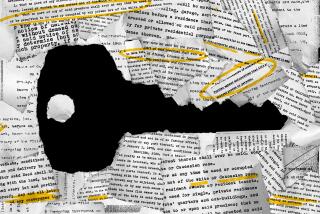Bitterness Expected to Linger in S. Africa
- Share via
PRETORIA, South Africa — Gerrit le Grange, retired race classification expert, still owns what he once fondly called “my people-tester”--a pencil that helped him determine race in otherwise tricky circumstances.
Le Grange would poke the pencil into a subject’s hair. If it dropped out, the person was considered white. If it stuck tight, the individual was assumed to be black.
In the newly reforming South Africa, Le Grange’s expertise is no longer needed.
But as some former administrators of apartheid and many victims of the policy observe, divisions and bitterness left by more than four decades of white supremacy will not simply disappear once segregationist laws are scrapped.
“Sadly, I took my job very seriously,” Le Grange recalls.
In the 1950s, he helped enforce the Population Registration Act, a law classifying people by race and serving to underpin the country’s racial divisions.
“We used to go to incredible lengths to determine race when factors like skin color were not decisive . . . unfortunately, people remember. Those kinds of memories live on,” he said.
“Blacks have been hurt for so many years . . . we are sore,” says Marshall Molekanea, a longtime resident of the nation’s largest black township, Soweto.
Pointing to the U.S. experience of trying to phase out inequalities, analysts are also pessimistic that wounds can be quickly healed.
While the overt racism dubbed baasskap (the Afrikaans term for paternalistic white domination) has retreated to conservative rural areas and the caucuses of right-wing politics, few observers suggest that ingrained suspicion between 28 million blacks and 5 million whites does not run deep.
“Where has it ever happened that legally entrenched racism has given way to a mixed paradise?” asks a researcher at an independent apartheid monitoring group, the South African Institute of Race Relations.
“The United States is a fine case in point . . . they may cover it up, but their race problems are far from being resolved,” he said.
President Frederik de Klerk on Feb. 1 took what he said were steps to rectify past injustices. He announced the pending demise of the last race laws, the Group Areas Act and Land Acts, which lay down where people may live and own land, and the Population Registration Act. Parliament is to abolish them this year.
“It’s really not enough,” says black Johannesburg resident Steff Mokae, who has lived illegally in the central white residential area of Berea since 1984.
“Now they must address the social issues that are still with us,” Mokae adds, reflecting the immediate reaction of most black leaders to De Klerk’s reforms.
One former administrator of black municipal affairs in Transvaal province concedes that “a lot more must be done to make people satisfied.”
The government acknowledges that there is damage to be repaired, but has not committed itself to decisive measures.
After De Klerk’s speech, Cabinet ministers went to work assuring blacks the reforms would be followed up by, in the words of Constitutional Affairs Minister Gerrit Viljoen, “real steps to follow them through.”
Black leaders have been waiting to find out exactly what those steps are. Such measures as affirmative action are anathema to most of Pretoria’s policy-makers, and cash for social advancement is tight in the recessionary economy.
“The reforms announced by President Frederik de Klerk will not immediately change the lives of the masses,” the Sowetan newspaper editorialized. “It has taken much bloodshed, much bitterness, many broken lives to get to this point.”
More to Read
Sign up for Essential California
The most important California stories and recommendations in your inbox every morning.
You may occasionally receive promotional content from the Los Angeles Times.












